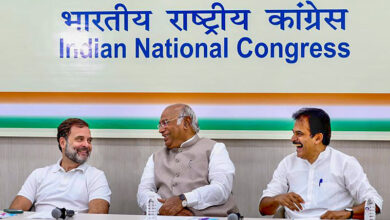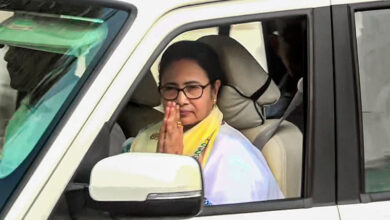
Centre Holds Review Meet To Discuss Covid Situation In 10 States
[ad_1]
New Delhi: Expressing serious concern over the 10 states of Kerala, Maharashtra, Karnataka, Tamil Nadu, Odisha, Assam, Mizoram, Meghalaya, Andhra Pradesh and Manipur showing a rising trend in Covid-19 cases, the Union Health Ministry has asked states to impose strict restrictions in all districts that are currently recording a positivity rate of more than 10 percent.
This came after Union Health Secretary Rajesh Bhushan chaired a high-level meeting today to review the Covid-19 situation in these 10 states.
The public health measures taken for surveillance, containment and management of Covid-19 by the health authorities in these states were also reviewed.
READ: Is Third Wave Close? Cases Surge As People Become Lax About Covid Norms With Restrictions Easing
These states are either reporting a rise in new daily Covid-19 cases or a rise in positivity.
Underlining the critical Covid control and management strategies, the Health Secretary said all districts reporting positivity rate more than 10 percent in the last few weeks need to consider strict restrictions to prevent/curtail movement of people, formation of crowds and intermingling of people to prevent spread of infection.
It was underlined during the review meeting that any laxity at this stage will result in deterioration of the situation in these districts.
“More than 80% active cases in these states are reported to be in home isolation. There is need to effectively and strictly monitor these cases so that they are not intermingling and circulating in their neighbourhoods, community, village, mohalla, ward etc., and spreading the infection,” Bhushan underlined.
“The people in home isolation should be effectively monitored in such a manner to ensure that those who require hospitalization are seamlessly transferred for timely clinical treatment,” he added.
The Health Secretary said the detailed SOPs covering various facets of effective clinical management of Covid-19 patients in hospitals have been earlier shared with the states for prompt shifting and effective hospital management.
The states were also asked to focus on those districts where the positivity rate is less than 10 percent so as to protect these districts and the populations by focusing on saturation of vaccination in these districts.
Bhushan underlined the Union Health Ministry provides advance visibility on a fortnightly basis to enable the states to plan their vaccination schedules in an effective manner.
The states were informed that this quantum of vaccine doses indicates the minimum possible allocation by the Centre to the states; quantum more than this is usually delivered by the Union Health Ministry to the states based on their consumption.
The Health Secretary said the Union Government has been in the last two months supporting the states by providing oxygen concentrators, oxygen cylinders and PSA plants.
In addition to this, the states are using their own resources to put up PSA plants in government hospitals.
The states were also advised to direct the private hospitals to put up hospital-based PSA plants.
“States have been advised earlier regarding this in the past two months. Provisions under the Clinical Establishment Act enable States to issue such direction to the private hospitals. For states which have already issued such directions, they were advised to review the status and facilitate the private hospitals further,” Bhushan said.
Indian Council for Medical Research (ICMR) DG Dr Balram Bhargava, who was also present during the meeting, warned against any complacency with around 40,000 cases being reported daily since the preceding weeks.
Highlighting the fact that 46 districts are showing more than 10 percent positivity while another 53 districts are showing a positivity between 5 percent -10 percent, he urged the states to ramp up their testing.
The states were also advised to conduct their own state level sero-surveys for district-wise disease prevalence data, as the national level sero-prevalence survey was heterogeneous in nature, in collaboration with ICMR to ensure the same sturdy protocols of survey.
Dr Bhargava advised the states to ramp up vaccination in the 60+ and 45-60 age categories as evidence shows near 80 percent of the mortality is from these vulnerable age-groups.
Regarding enforcement measures, he advised the state authorities for avoiding all non-essential travel and to discourage all large gatherings of crowds.
Through a detailed presentation, a granular analysis of the highly affected districts (Districts of Concern) in these states, COVID-19 Vaccination Coverage, Status of Ventilators, PSA Plants, Oxygen Cylinders and Concentrators along with some key statistics was presented.
The states were advised to undertake intensive containment and active surveillance in clusters reporting higher cases.
ALSO READ: Delta Plus Scare: Centre Announces Existence Of Most Virulent Variant In Telangana
Advising the states to define containment zones, based on mapping of cases and contacts traced, the Centre asked them to undertake regular reviews and follow-up for implementation of ECRP-II with a focus on augmentation of existing health infrastructure particularly in rural areas and paediatric cases.
The Centre also asked the states to report death count as per the ICMR guidelines.
Check out below Health Tools-
Calculate Your Body Mass Index ( BMI )
Source link



